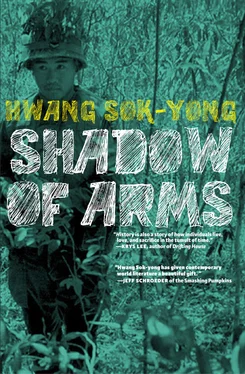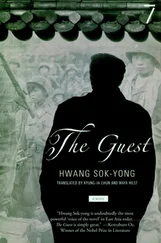“America does not like wars. Early in her history, the United States, just like your country, struggled to obtain freedom and human rights, to escape from colonization and to achieve the level of prosperity that we enjoy today. It is a prosperity that America has a responsibility to share with other weaker and less fortunate countries around her. Therefore, the goal of the foreign aid given by the United States is to maintain her promise to help Vietnam free herself from the threat of Communism and regain peace throughout the nation once more. Vietnam is now a patient in critical condition and we, the Americans, are treating Vietnam in order to make her healthy once again.”
In interpreting, Pham Quyen was very sensitive to the differences in nuance between English and his own language. When the ceremony was over, the Americans would get into their helicopters and leave, but from now on the administration and maintenance of the An Diem phoenix hamlet would be the responsibility of the provincial government. So, rather than faithfully interpreting Butler’s speech to the villagers, Pham Quyen found it necessary to convey with proper obscurity the position of the provincial administration. It was nothing more than the usual hollow rhetoric and ambiguous trickery. In fact, the harsh reality was that day in, day out, countless Vietnamese were being maimed and bloodied, losing their limbs and their lives. A speech by the American secretary of defense, published recently in Da Nang’s English-language newspaper, came to his mind:
“About one hundred countries are engrossed in the difficult task of modernizing their societies. There are no uniform standards for progress across these countries. At one extreme, there are societies still primitively structured, divided into clans or tribes with a weakly unified political system. On the other extreme, there are relatively developed countries that, with various levels of success, have made strides toward agricultural abundance and industrial competitiveness.
“This storm-like surge of rapid development is prevalent throughout the southern hemisphere. In all of history it is difficult to find any precedent even roughly analogous. As a consequence, this traditionally lethargic part of the world has developed into a seething maelstrom of change. On the whole, the changes have not been smooth. If certain confluences of events bring economic stagnation or armed conflict, chaos and violence may rage for many years. This would be true even if there were no threat of Communist aggression. With or without Communist interloping, violence is evident in radical forms across the complex international relationships in a world full of tensions. And the national security of the United States of America is linked with the safety and security of developing countries in the far corners of the earth.”
Pham Quyen was also familiar with more concrete and dispassionate expressions of the same sentiments. A certain advisor to the US president once put it plainly: “Plans for foreign aid are drawn up to dispense a variety of loans and grants: some donations are to provide recognition to foreign leaders, some are plans hastily hatched to counter and hinder Soviet aid, and others are to fund ventures to enhance the power of ruling governments.”
While Butler was delivering his speech, Major Pham Quyen filtered the appropriate Vietnamese words out from the English streaming through his head, and in the process he could hear the distinct echo of other voices murmuring:
“Foreign aid from the United States is categorized according to the following goals and consequences: to implement America’s military and political policies in the international arena; to uphold an open-door trade policy, in other words, to obtain free access to natural resources and trading markets, and to furnish investment opportunities for American companies; to support those American companies in search of trade and investment options to obtain immediate economic returns; to ensure that economic development of underdeveloped countries is firmly grounded in capitalistic processes; to make the recipient countries gradually more dependent on the United States and other capitalist markets; and to allow the debts incurred through extension of long-term loans to forge permanently binding chains of trade between the recipient countries and the capitalist markets of the core creditor nations.”
Presently the speech by the governor, General Liam, began. Major Pham Quyen had written it himself. There was not a single mention in the speech of the administrative measures that would have to be introduced in dealings between the villagers and the provincial government. It was better to avoid any detailed discussion of financial support for the farmers, the new facilities to be constructed, the amount of cement to be supplied, and especially of the rice rations or money wages to be paid before the harvest. Not a word was said about the resettlement allowances, the land allotments, or the promised grants of pigs, cattle, and fertilizer. The speech consisted mainly of high-flown talk about the notion of peace, and a call for the villagers to exhibit diligence and a cooperative attitude. As General Liam concluded the speech, Major Pham Quyen cued the villagers to clap and there was a big round of applause.
To the sound of the brass band, the general, the American AID representative, the mayor of Hoi An, and the division commander all marched over to the ceremonial ribbon hanging at the gate on the main street of the hamlet. The ribbon was made of white nylon fabric. Some young girls brought out a shiny new pair of scissors on a cloth-covered tray and held it out to the four dignitaries. Cameras flashed as the ribbon was cut.
With General Liam and Butler side-by-side and a long line of people in tow, the group marched along past the new houses. Pham Quyen and the lieutenant in charge of security walked directly behind General Liam. The general halted in front of a house located in the center of the hamlet, opened the door and looked inside. As in a traditional Vietnamese residence, the structure was built as a single room, just four walls and a ceiling. Partitions made of bamboo and reeds were placed along the walls of the wide hall, and the area in the center was used for eating and drinking tea. Given the layout of the house, a young couple had to get a strong and sturdy bed so that the creaking sound of their lovemaking would not disturb the others in the family. The interior of this house had a concrete floor, but the walls were whitewashed and partitions were set up. There was a back door and, beside it, a kitchen.
“Wonderful,” said General Liam.
Mr. Butler looked into a partitioned space that seemed to be a bedroom. There was no door, but a curtain or bamboo screen would probably be hung at the entrance. Mr. Butler looked back at Major Pham Quyen.
“When the next generation is born in this room, Vietnam will be sure to regain eternal peace.”
Pham Quyen quickly responded with a smile.
“Of course, sir. They’ll be phoenix babies, so to speak.”
“What is that?”
With a look of curiosity, Mr. Butler pointed to a hole that had been dug out in the middle of the yard.
“Ah, I’m afraid I don’t know, sir.”
Pham Quyen turned around to ask one of the entourage from the provincial administration, a civilian, who hurried over to question the villagers. He then rushed back to Pham Quyen in a fluster.
“It wasn’t in the plans, sir. They say it’s a bomb shelter.”
“Who dug it?”
“Well, looks like each resident already fixed up his house somewhat. There’s even one with a Buddhist altar already installed.”
“Who gave them permission to make changes even before moving in?”
Pham Quyen said no more and turned back to Mr. Butler who was waiting for an answer with a curious look on his face.
Читать дальше












